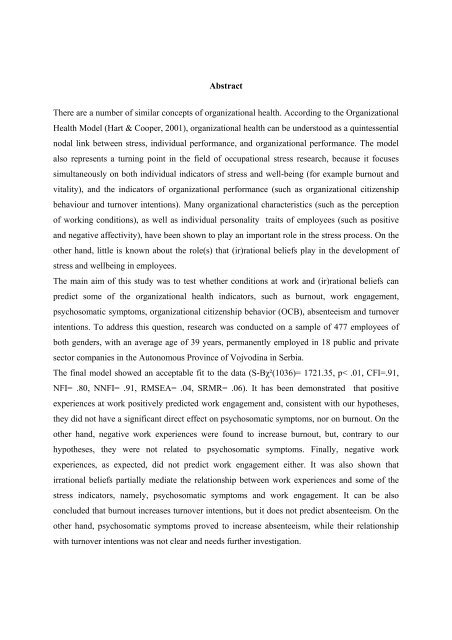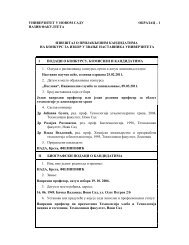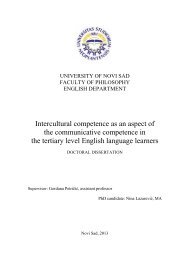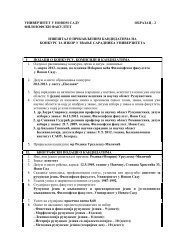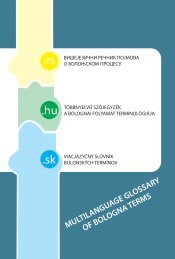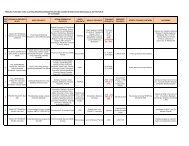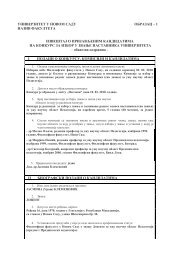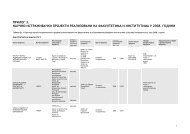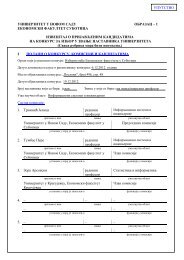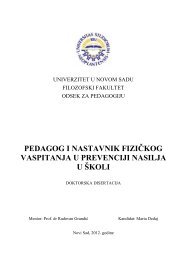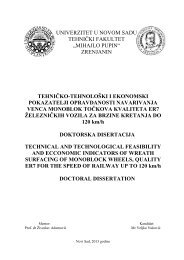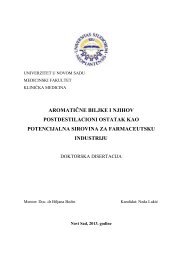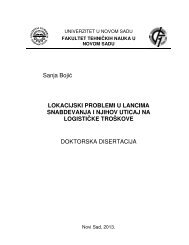Univerzitet u Novom Sadu Filozofski fakultet Odsek za psihologiju ...
Univerzitet u Novom Sadu Filozofski fakultet Odsek za psihologiju ...
Univerzitet u Novom Sadu Filozofski fakultet Odsek za psihologiju ...
You also want an ePaper? Increase the reach of your titles
YUMPU automatically turns print PDFs into web optimized ePapers that Google loves.
Abstract<br />
There are a number of similar concepts of organi<strong>za</strong>tional health. According to the Organi<strong>za</strong>tional<br />
Health Model (Hart & Cooper, 2001), organi<strong>za</strong>tional health can be understood as a quintessential<br />
nodal link between stress, individual performance, and organi<strong>za</strong>tional performance. The model<br />
also represents a turning point in the field of occupational stress research, because it focuses<br />
simultaneously on both individual indicators of stress and well-being (for example burnout and<br />
vitality), and the indicators of organi<strong>za</strong>tional performance (such as organi<strong>za</strong>tional citizenship<br />
behaviour and turnover intentions). Many organi<strong>za</strong>tional characteristics (such as the perception<br />
of working conditions), as well as individual personality traits of employees (such as positive<br />
and negative affectivity), have been shown to play an important role in the stress process. On the<br />
other hand, little is known about the role(s) that (ir)rational beliefs play in the development of<br />
stress and wellbeing in employees.<br />
The main aim of this study was to test whether conditions at work and (ir)rational beliefs can<br />
predict some of the organi<strong>za</strong>tional health indicators, such as burnout, work engagement,<br />
psychosomatic symptoms, organi<strong>za</strong>tional citizenship behavior (OCB), absenteeism and turnover<br />
intentions. To address this question, research was conducted on a sample of 477 employees of<br />
both genders, with an average age of 39 years, permanently employed in 18 public and private<br />
sector companies in the Autonomous Province of Vojvodina in Serbia.<br />
The final model showed an acceptable fit to the data (S-Bχ²(1036)= 1721.35, p< .01, CFI=.91,<br />
NFI= .80, NNFI= .91, RMSEA= .04, SRMR= .06). It has been demonstrated that positive<br />
experiences at work positively predicted work engagement and, consistent with our hypotheses,<br />
they did not have a significant direct effect on psychosomatic symptoms, nor on burnout. On the<br />
other hand, negative work experiences were found to increase burnout, but, contrary to our<br />
hypotheses, they were not related to psychosomatic symptoms. Finally, negative work<br />
experiences, as expected, did not predict work engagement either. It was also shown that<br />
irrational beliefs partially mediate the relationship between work experiences and some of the<br />
stress indicators, namely, psychosomatic symptoms and work engagement. It can be also<br />
concluded that burnout increases turnover intentions, but it does not predict absenteeism. On the<br />
other hand, psychosomatic symptoms proved to increase absenteeism, while their relationship<br />
with turnover intentions was not clear and needs further investigation.


